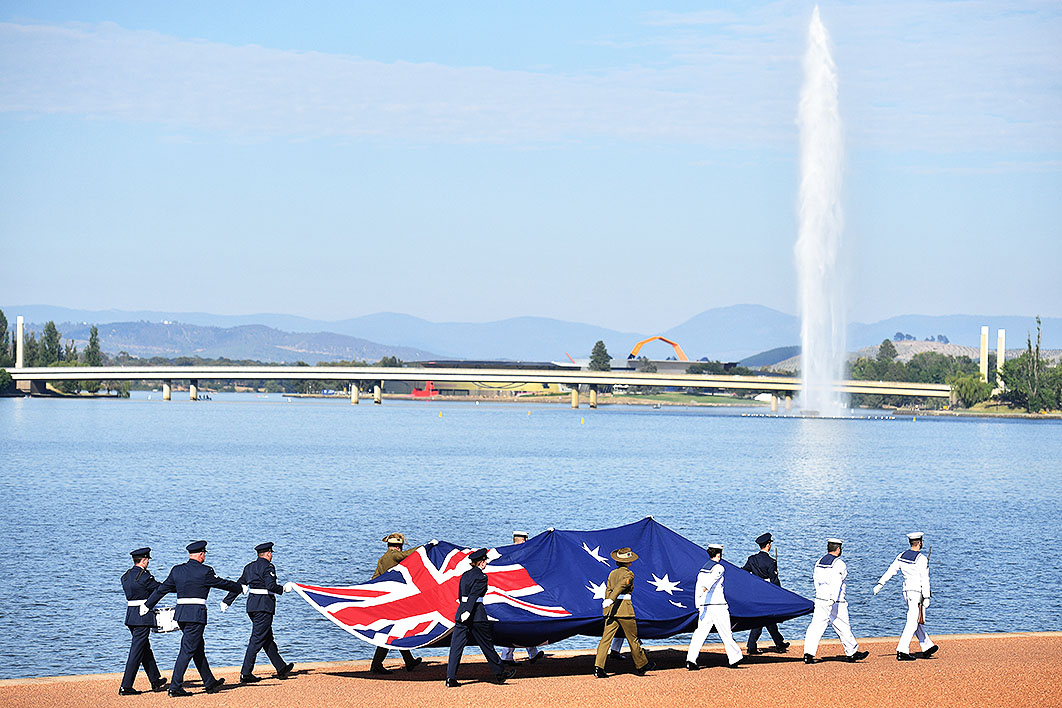For a moment, as my plane finally descended into Canberra at the end of the long trip from Germany, I thought we must be making an emergency landing. I could see no trace of human life below. This seemingly uninhabited landscape was where I was to take up an Australian government merit-based Endeavour Scholarship in 2006 to complete a PhD.
I had no intention of staying in Australia for long, and definitely not forever. I spent the best part of the next four years writing my dissertation on the long-distance politics of the Acehnese diaspora, at the Australian National University. It was a formative period in my life; I enjoyed it to a certain extent but did not want to stay a single day more than was absolutely necessary, and returned to Germany in March 2010 on completion of my thesis.
After a postdoctoral fellowship in Berlin, I landed a teaching position at the university in Heidelberg, which was no great improvement on my years in Canberra in terms of excitement beyond my academic pursuits. But when the opportunity of a three-year research-only fellowship at the Melbourne Law School arose I jumped at the chance, and in June 2011 I travelled Down Under once again.
For three years I studied the irregular movements of asylum seekers from Indonesia to Australia, spending a lot of time doing fieldwork in Indonesia, publishing my insights, writing op-eds, giving radio interviews — doing everything I could to share my findings within academia and beyond. When the three years of my fellowship were up, I boldly applied for a Discovery Early Career Researcher Award from the Australian Research Council. These sought-after grants are hard to get but, given the topicality of my research, I thought I should give it a try. The success of my application was topped off by the offer of a job at Monash University, putting me in the wonderful position of being able to continue my work, reading, writing and carrying out long stretches of fieldwork (as anthropologists do). By this time my focus had shifted to exploring people-smuggling networks in Indonesia.
In early 2014 — in spite of the very high cost (about $4000), including the $330 fee to undertake another demeaning language test — I decided to apply for a permanent residence visa. (Apparently, publishing academic articles and books in English is not sufficient evidence of basic language proficiency in Australia.) Although my employer declined to cover any of the cost, I still decided it would be a worthwhile investment in my future, and certainly a better option than paying the $1780 fee to renew my temporary 457 visa over and again.
Furthermore, I’d had the pleasure of paying tax in Australia for some years, and as a permanent resident I could at least reap some benefit by gaining access to Medicare rather than continuing to pay for my own healthcare. Being part of the Medicare community might even save me from having to pick a local footy team — or, God forbid, a cricket team — to visibly express my emotional belonging to a larger “imagined community.”
By the time I became a permanent resident, I had spent most of seven years in Australia. Although I never considered Australia to be my home — the German equivalent mein Zuhause is heavily laden with connotations of sentimental rootedness — Melbourne had, in a way, become my base camp, primarily for professional reasons.
The idea of applying for Australian citizenship crossed my mind when I overheard some German colleagues in the staff kitchen discussing ways of obtaining dual citizenship, which German law usually does not allow. Under no circumstances would I give up my German passport, which is, after all, the world’s “most powerful” passport, according to the Henley Passport Index, which ranks all the passports of the world according to the number of countries their holders can travel to visa-free. My main incentive to apply for Australian citizenship and then an Australian passport was, quite frankly, the prospect of no longer having to wait for hours in immigration queues each time I returned to Australia. (My humble travel experiences have taught me that the services at Melbourne Airport’s immigration checkpoints fall far behind their counterparts in not-so-rich countries I have visited recently, including Ghana, Uganda and St Lucia.)
Having just been awarded another ARC research grant, staying on in Australia also felt like a force majeure, so I thought I might as well become a real citizen rather than remain a second-class member of society who is welcome to make generous tax payments but not given the opportunity to help vote in a better federal government. My decision was further driven by additional financial considerations: the cost of extensions to my permanent residence, and eligibility for Australian research funding options that are reserved for citizens. (I had noticed that it had become increasingly difficult to receive funding from German research organisations once I was no longer associated with a German university.)
In order to apply for Australian citizenship, I first had to apply to the German Federal Administrative Court for special exemption, which was granted but only valid for two years. Until then, I had never considered Australian citizenship (or any other citizenship) as a privilege that one had to earn through heroic deeds or self-sacrifice. Rather, I saw citizenship as an administrative product of coincidence, as nobody gets to choose where they are born. I tended to think that one needs some sort of citizenship to be considered a full human being in our modern world, and the process of applying for a new or additional one was — despite being a cumbersome bureaucratic formality — basically doable, as the conditions for obtaining it would be based on fair and logical premises.
Of course, I was wrong. Holding citizenship is so much more than just a simple managerial requirement. Nowadays, citizenship is the very basis to claim rights; ergo, not holding citizenship in the place where one happens to live is a powerful means of exclusion.
Having fulfilled the requirement of being an Australian permanent resident for four years and with the green light from Germany, I rushed to collect all the required documentation (including good-conduct certificates from several countries and evidence that I had paid my gas and electricity bills) to show I was indeed thoroughly deserving of citizenship of the Lucky Country. I submitted my application just before Christmas in 2016.
In March 2017, I was informed that my application had been rejected because I had been out of Australia for seven days more than I should have during the designated period. (Applicants must not be absent for more than three months of the year in which they lodge their application.) I must say that the rejection threw a spanner in the works, not least because such a ruling seemed so out of touch with reality: are we not living in the age of mobility? How could the work-related travel necessary to meet the requirements of research grants from the Australian government possibly count against me, one of the most privileged categories of migrants?
After consulting with colleagues and lawyers about whether to appeal this decision, I decided not to, simply because — with the two-year deadline imposed by the German court upon me — it would take too long for my case to be heard. Plus, based on the low success rate of appeals at the Administrative Appeals Tribunal it would have been a waste of time, money and energy. Instead I opted to reapply, even though I had just received a six-month fellowship at Stanford University that once again would prevent me from meeting the Australian citizenship requirement to stay put for nine months of the year. But who on Earth would decline an offer to go to one of the world’s most prestigious universities in California?
My new application was supported with letters from the dean and the head of school from my university testifying that regular fieldwork trips overseas and conference travel were indeed part of my job and a requirement of the grants I had received. Understanding that scientists are exempt from the nine-month residence rule in their citizenship applications, the supporting letters spelled out to immigration officials that to be offered overseas academic fellowships such as the one I was about to take up was evidence of my solid reputation as a social scientist, which in turn should make me more desirable as an Australian citizen — or so one might think.
In November 2017, my second application was rejected by the Department of Immigration and Border Protection, which claimed that I did not match the department’s definition of scientist to be granted an exemption from the nine-month rule. Its definition only recognised natural scientists as scientists. Although my identity wasn’t exactly shattered by its evaluation, I began to wonder what I had actually been doing all those years — collecting and analysing data from fieldwork in Indonesia — if it was not some sort of science?
But I soon learned I was not the only non-natural scientist to be rejected. A friend of mine, himself a lecturer in law and thus also a social (and legal) scientist, suffered the same fate. Unlike me, he was more insistent on his status as a scientist and took his rejection to the Administrative Appeals Tribunal to test the narrow definition held by the even more narrow-minded department. He lost. The tribunal decided not to look at just the ordinary meaning of the word scientist but the intention of the “makers of the instrument.” It found that the minister’s speech introducing the relevant Bill to parliament in 2009 and the use of “the proper noun ‘Scientist’… did not assist the applicant’s contention that the special residence requirement can be relied upon by a broader category of PhD-qualified academics.” It thus held that the term scientist could only apply to physical and natural scientists.
I find it hard to believe that the law-makers back then intentionally planned to discriminate against certain other — political, social, environmental and many other — scientists. But then again, reading through the first pages of Donald Horne’s The Lucky Country suffices to cast some doubt. “Australia is not a country of great political dialogue or intense searching after problems (or recognition of problems that exist).” Not my words, but Horne’s.
What is to be learned from my two failed attempts to attain Australian citizenship? Well, first of all, it is clear that holding an academic position at a School of Social Sciences and winning research grants does not make one a scientist. Moreover, there is no cure for residence deficiency, unless I want to lose my current job. I received yet another three-year Australian Research Council grant in November 2017, for which I will need to conduct fieldwork in Indonesia for more than three months each year. If I do what I need to do, my ineligibility for Australian citizenship will be guaranteed.
Some colleagues suggest that I stay put for nine months and “get it over with” (which is a bit reminiscent of the kind of advice Victorian mothers passed on to their daughters before their wedding night). Staying put would mean I must not attend any conferences outside Australia, present at any overseas workshops, or carry out any fieldwork (not to mention attending unexpected weddings and funerals back home). I might lose a year of career advancement, but for that year of being grounded I might be rewarded with Australian citizenship. Right now, it just does not seem worth it. So I will remain one of the many permanently temporary migrants who are increasing in number in Australia. •
This essay first appeared in Griffith Review 61: Who We Are, edited by Julianne Schultz and Peter Mares.




